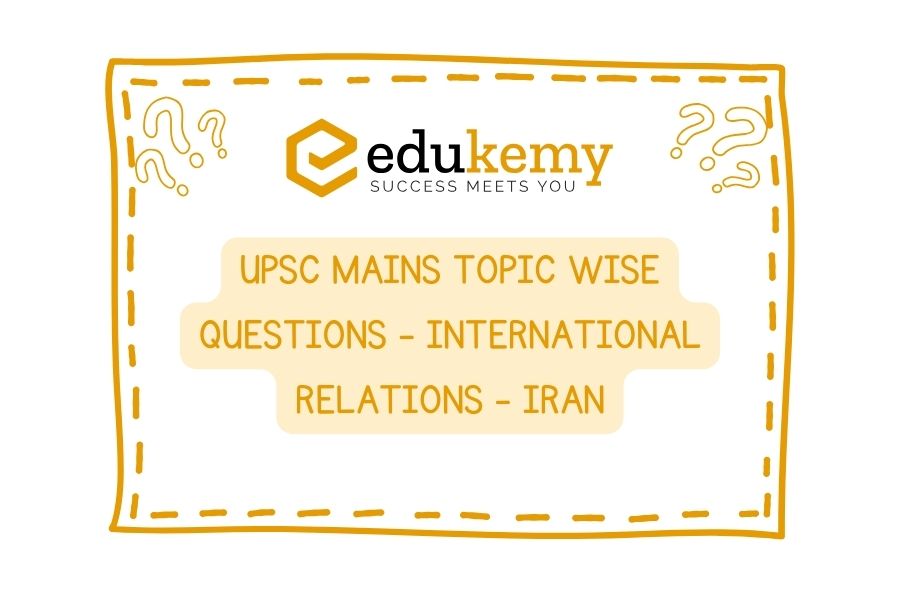Explore a comprehensive collection of UPSC Mains topic-wise questions focusing on International Relations, specifically highlighting Iran. Engage with a diverse range of inquiries covering Iran’s foreign policies, regional influence, and diplomatic engagements with other nations. These meticulously curated questions offer valuable insights into the complexities of Iran’s role in global geopolitics, aiding UPSC aspirants in developing a nuanced understanding of contemporary international dynamics. Prepare effectively for the UPSC Mains examination by delving into thought-provoking queries tailored to enhance analytical skills and deepen comprehension of Iran’s strategic significance on the world stage. Gain a competitive edge in your preparation by immersing yourself in the intricate web of Iran’s diplomatic relationships and geopolitical challenges.
Contents
- 1 Q1. Write about the Al Gharib prisoners. (2004, 2Marks)
- 2 Q2. Examine the latest phase of Indo-Iran relations. (2001, 15 marks)
- 3 Q3. Explain the political and economic implications of the Indo-Iran gas pipeline. (2005, 15 Marks)
- 4 Q4. How have the US sanctions against Iran affected India’s bilateral relations with Iran? (2012,10 Marks)
- 5 In case you still have your doubts, contact us on 9811333901.
Q1. Write about the Al Gharib prisoners. (2004, 2Marks)
Answer: The Al-Gharib prisoners were a group of individuals held in solitary confinement without charges or trial. This practice, often employed to extract confessions or intimidate political opponents, raises concerns about human rights and due process. The UPSC, emphasizing ethical governance, would condemn such practices
Q2. Examine the latest phase of Indo-Iran relations. (2001, 15 marks)
Answer: Since 2001, Indo-Iran relations have witnessed a complex interplay of strategic convergence and divergence. This essay will analyze key developments shaping this relationship.
Strategic Convergence:
- Energy Security: Iran is a crucial source of oil for India. Cooperation in the Chabahar port project provides India access to Afghanistan and Central Asia, bypassing Pakistan.
- Counter-terrorism: Both nations face threats from Sunni extremist groups. There has been increased intelligence sharing and security cooperation.
Strategic Divergence:
- US Sanctions: Imposition of US sanctions on Iran has complicated economic ties with India. Balancing ties with Iran and the US remains a challenge for India.
- Chabahar Development: Progress on Chabahar port development has been slow due to sanctions and bureaucratic hurdles.
Other Considerations:
- INSTC (International North-South Transport Corridor): Operationalization of INSTC could be a game-changer for regional connectivity, but security concerns in Afghanistan pose a challenge.
- Cultural and People-to-People Ties: These ties remain strong, underpinning the historical connect between the two nations.
Conclusion:
Despite challenges, India and Iran share common interests in regional stability and economic cooperation. Managing US sanctions and expediting Chabahar development will be crucial in determining the future trajectory of this relationship.
Q3. Explain the political and economic implications of the Indo-Iran gas pipeline. (2005, 15 Marks)
Answer: The Indo-Iran gas pipeline proposal, also known as the Peace Pipeline, held significant political and economic ramifications for India in 2005. This answer will analyze both aspects.
Political Implications
- Energy Security: The pipeline offered India a reliable and potentially cheaper source of natural gas compared to Liquefied Natural Gas (LNG). This diversification would lessen dependence on volatile oil markets and geopolitically sensitive regions.
- Regional Cooperation: Successful completion could foster closer ties with Iran, a nation with strategic importance in the region. It could act as a confidence-building measure, potentially leading to increased regional stability.
- US Concerns: However, the project faced opposition from the US, which had strained relations with Iran. India had to navigate this complex diplomatic landscape to secure American approval.
Economic Implications
- Economic Growth: Access to cheaper and abundant natural gas would fuel power generation and industrial activity, potentially leading to economic growth.
- Infrastructure Development: The pipeline’s construction would necessitate significant infrastructure development in Iran and Pakistan, creating jobs and boosting regional economies.
- Commercial Viability: The project’s economic viability depended on factors like gas price negotiations, security concerns along the route, and alternative sources like LNG.
Conclusion
The Indo-Iran gas pipeline offered a promising avenue for India’s energy security and economic development. However, navigating the complex geopolitical landscape and ensuring commercial viability were crucial considerations.
Q4. How have the US sanctions against Iran affected India’s bilateral relations with Iran? (2012,10 Marks)
Answer: US sanctions on Iran placed a strain on India-Iran relations, particularly impacting their economic ties. Here’s how:
- Curtailed Energy Trade: Iran was a major oil supplier to India. Sanctions restricted financial transactions and investments, hindering oil imports and bilateral trade.
- Balancing Act: India, reliant on the US for strategic partnership, felt pressure to comply with sanctions. However, it publicly resisted complete compliance due to its energy dependence on Iran.
- Limited Options: Sanctions narrowed avenues for cooperation in sectors beyond oil and gas, like infrastructure development planned via the Chabahar port project.
Despite challenges, India pursued diplomatic channels to maintain dialogue with Iran, reflecting the importance it placed on the relationship.
In case you still have your doubts, contact us on 9811333901.
For UPSC Prelims Resources, Click here
For Daily Updates and Study Material:
Join our Telegram Channel – Edukemy for IAS
- 1. Learn through Videos – here
- 2. Be Exam Ready by Practicing Daily MCQs – here
- 3. Daily Newsletter – Get all your Current Affairs Covered – here
- 4. Mains Answer Writing Practice – here


